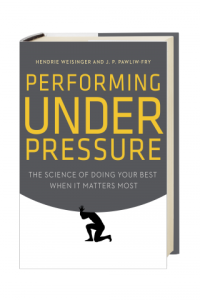If you want to give your kids life’s ultimate advantage, then …
Providing an SAT tutor, tennis and music lessons, or a trip to Europe to broaden cultural awareness are all frequent parental efforts to give their kids a life advantage. But none of these can compare to giving them the skills that will help them perform under pressure — it will give them the ultimate edge that will continually help them to advance themselves in life.
The fact is, most kids crumble under pressure — they perform below their capabilities when they want to do their best. Whether it’s taking the SATs, auditioning for a school play, trying out for the tennis team, or having to play their guitar at a family gathering, pressure is likely to worsen your kid’s performance. Memory, attention, judgment, decision making, psychomotor skills are all downgraded when they are in a pressure moment– a situation in which they have something at stake and the outcome is dependent on their performance.
And if your kids are in grade school or high school, their pressure moments are only going to increase. The APA Monitor, the flagship publication of the American Psychological Association recently reported that today’s college students are under more pressure today than ever before, to the point that university counseling centers are being overwhelmed by students seeking help.
Being able to handle pressure give your son or daughter life’s ultimate edge because it allows them to perform closest to their abilities, thus increasing their chances of success. Doing your best is no guarantee of success but for sure, if your kids can’t do their best in a pressure moment, they are disadvantaged. Teaching your kids to handle pressure gives them a mobile skill that they will be able to use throughout their life. Here are four proven tips to give them so they can do their best when it matters most.
Befriend the Moment
Perceiving a pressure moment as threatening – as a ‘do or die situation’ — undermines self- confidence, elicits fear of failure, impairs attention, short -term memory, judgment and spurs impulsive behavior. Teach your kids to think of their pressure moments as an opportunity, challenge, and fun. These words are inherent performance steroids and using them (eg. “The test is an opportunity to show off your knowledge; have fun at your audition”) will help your son or daughter approach the moment with a positive attitude.
Second Chances
Adolescents and young children typically believe that a pressure moment is their only chance to prove themselves, and thus make the moment the “most important” of their lives; exaggerating the importance increases the pressure they are likely to experience. Teach your children to see their pressure moments–be it a test or sporting event–as just one of many opportunities that will come their way.
Write off Pressure
It’s the night before your daughter’s audition, son’s big game, or SATs and their worried — how can you help reduce their pressure feelings? Spare the pep talk. Instead instruct your son or daughter to write out his or her concerns. Worrying diminishes processing power in our brains. A wide body of research shows that writing about your concerns before a pressure moment diminishes worry thoughts, enabling your son or daughter to stay focused and do their best. Expressing their concerns in writing will also provide them (and you) with insights about their sources of pressure.
Anticipate, Anticipate, Anticipate
What if your guitar string breaks in the middle of your audition? What if the test is an essay instead of a multiple choice? Most kids are thrown off course by the unexpected. Teach your kids to anticipate glitches and to mentally rehearse strategies for dealing with them. They will learn to be adaptive in pressure situations, and maintain their composure so they can do their best.
Highlight Their Successes
Success is a great confidence booster. Get your kids in the habit of frequently “flashing back” to their successes, especially seconds before they need to deliver the goods. “I’ve done this many times” is a thought that once habituated, will help reduce the pressure of their moments. Pay attention to your child’s successes so you will have many examples to help him or her remember that they are competent individuals and that their best efforts can allow them to meet challenges more often than not.
Share Feelings
Are you kids afraid to tell you they feel pressure? Too many kids, especially adolescents and young adults keep their feelings of pressure to themselves. You don’t have to be a psychologist to know that this is a poor way for them to cope and can lead to feelings of anxiety, depression, eating disorders, and suicidal ideation.
Encourage your kids to share their feelings about the pressures they experience. Help them problem solve by validating their feelings, clarifying their thoughts, and providing options for how they can navigate their life effectively. High school and college kids are under pressure -competition is a major source of this pressure. Modeling and attitude based around the idea that you should “focus on doing your best, not beating the other guy” will give them skills in reducing the pressure they feel. Sharing your own feelings of pressure and how you deal with them will give them ideas about how to manage their own pressure: be a pressure management model.
Pressure is an inherent part of life. The sooner you teach your kids how to perform under pressure, the sooner you’ll give them life’s ultimate edge.
learn more ways to help your kids–and yourself–perform under pressure and reduce daily feelings of pressure with this new Performing Under Pressure E Course Experience
http://pressure.hendrieweisingerphd.com Information will be added so continue to check the link.
follow me @pressuretweets


